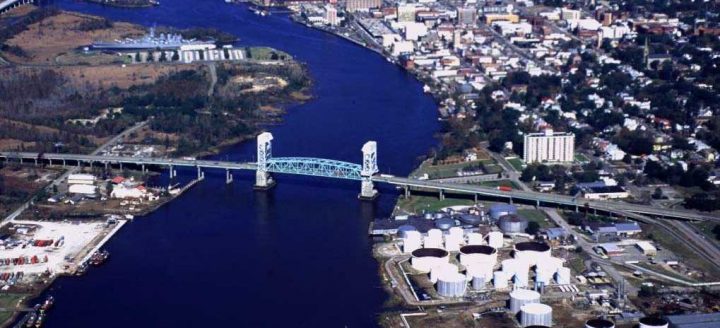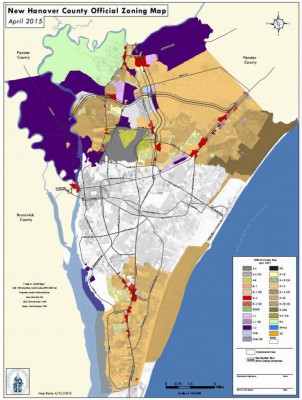
WILMINGTON – New Hanover County’s newest proposed requirements for an industrial special-use permit may not be perfect, but the zoning rules represent a compromise and good starting point for managing the types of industry in the county, proponents say.
In a 6-1 vote, the New Hanover County Planning Board on Thursday approved a series of text amendments to the county’s zoning ordinance regarding special-use permits. The action followed a public hearing in the assembly room at the county courthouse in downtown Wilmington. County commissioners are expected to consider and vote on those changes following a public hearing next month.
Supporter Spotlight

Special-use permits are a way to make zoning rules more flexible, by permitting, under certain conditions, property uses not allowed by right, such as operations that could affect surrounding areas. Under the proposed zoning rule changes, the planning board would not consider a special-use permit for so-called intensive industries until after a review period of 35 business days.
Intensive manufacturing includes animal slaughtering and processing; paper and paperboard mills; petroleum and coal products manufacturing; pesticide, fertilizer and other agriculture chemical manufacturing; explosives manufacturing; and alumina refining, secondary smelting and alloying of aluminum production. These types of industries would be permitted as a special use only in the county’s heavy industrial district.
The proposed amendments require an applicant in any of these industries to hold a community information meeting to share its manufacturing proposal with the public. This must occur before the planning board deems an application complete.
The rules also mandate that an applicant give a written description of the proposed development, identify on a map federal and state wetlands that may be affected by the project, and identify all local, state and federal permits, such as air and water quality, that the project may require.
New Hanover County adopted the existing special-use permit provision for industry in 2011.
Supporter Spotlight
Pressure from business groups that claim the SUP requirements deter economic growth prompted county staff and the planning board in 2014 to begin an overhaul of the zoning rules. Their suggestions sparked concerns among residents and environmental groups, who feared some of the proposed changes loosen the vetting process for intensive industry and manufacturing.

The county’s proposed amendments have the support of the local business community and the North Carolina Coastal Federation, both of which have for months been actively participating in trying to update the county’s industrial permitting process.
Tyler Newman, president and CEO of Business Alliance for a Sound Economy, or BASE, was the first to speak in support of the proposed changes during the planning board’s meeting in a packed county commissioners’ chambers.
“I’m pleased to stand up here today and tell you that we have truly reached a consensus,” Newman said.
Hal Kitchin, an attorney and Wilmington Chamber of Commerce board member, agreed.
“With all that work that’s gone into this, it’s very gratifying to stand up here today and say there is a consensus on how to move forward,” he said. “It is a solution we can all live with.”

Mike Giles, a coastal advocate with the Coastal Federation’s Wrightsville Beach office, said the proposed revision is an important milestone for the community.
The Coastal Federation led a community task force where, for months, various stakeholders hashed out a “model” industrial SUP.
The language approved by the planning board is a compromise of the federation’s model SUP and amendments suggested in what is referred to as the 2014 SUP, which critics deem heavy-handedly pro-business, said planning board chair Donna Girardot.
“I feel confident that the draft tonight before us is complete,” she said. “Could it be better? Perhaps. This is a bridge. This document will probably serve us for about a year while we go through this [unified development ordinance] process. If there’s pieces in it, if there’s changes, we’re going to have to come back to the table and we can make those changes at that time.”

In a statement supporting the county’s proposed amendments, the federation said that while those changes do not include everything the organization desires, “we believe that this compromise is a significant improvement that will make the SUP process more transparent and rigorous for intensive industries.”
There is, however, looming concern about the table of permitted uses in the proposed SUP language.
The permit process allows some manufacturing uses currently designated in heavy industry zones to move to “general” or “limited” zones. Critics point out that these zones are closer to neighborhoods and retail businesses.
Industries that would be reclassified under the proposed changes include basic chemical manufacturing of resin, synthetic rubber, and artificial synthetic fibers, glass and glass product manufacturing, cement and concrete product manufacturing and plastics product manufacturing.
The review period for these types of industries is 20 business days under the proposed changes. Unlike intensive manufacturing, these industries would not require community information meetings.
New Hanover County resident and business owner Dr. Robert Parr said the proposed changes to the table of permitted uses may allow toxic air emissions in light industrial areas adjacent to residential communities and businesses.

“Chemicals, paint, refractory, glass and pharmaceutical manufacturing release large emissions of air pollutants,” Parr said. “Are theses changes reasonable? Do they protect existing property values? Do they safeguard the quality of life and the public health in these areas? My opinion is that they do not.”
Roger Shew, a professor with the University of North Carolina at Wilmington’s Department of Earth and Ocean Sciences, said the industries reclassified in the proposed changes need more thorough review.
“Several of those industries really give me true pause,” he said.
Former New Hanover County Commissioner Karen Gottovi also urged the planning board to re-think the reclassifications.

“I probably signed over 100 to 150 of these during my eight years on the county commission and some of it came back to bite us badly,” she said.
David Weaver, the only planning board member who voted against the amendments, said he too believes those industries should be required to disclose the types of external effects they may have on the county.
“Why are we doing this? Is our economy weakening? Do we need to go out and weaken our regulations to attract industries that may be on the margin, may be on the cusp, may have undesirable impacts? I would say no,” he said.
The public will get another opportunity to express its support or opposition to the proposed industrial SUP requirements at a public hearing during the county commissioners’ March 6 meeting. The meeting will begin at 4 p.m. in the county courthouse, 24 N. Third St.







